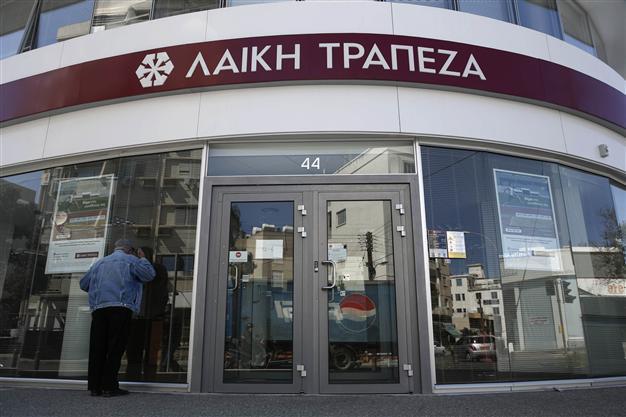Nervy Greek Cyprus reopens banks under armed guard
NICOSIA- Agence France-Presse

A man tries to look inside a branch of Laiki Bank a few hours before the reopening of the banks on the island in Nicosia March 28, 2013. REUTERS Photo
Greek Cyprus banks prepared to reopen under armed guard today after a long lockdown, with harsh curbs to stop depositors punished by a eurozone bailout from draining the island's coffers dry.
Bank tellers urged customers not to take out their frustrations when the doors swing open at 12:00pm (1000 GMT) for the first time in 12 days, while authorities trucked in shipping containers full of euros under heavy security.
World markets were jittery over the crisis, which has seen capital controls imposed for the first time by a eurozone economy in order to prevent financial meltdown after the 10-billion-euro ($13-billion) EU-IMF rescue package.
Most banks in Nicosia had between one and three guards posted at their entrances early morning, some of them carrying weapons -- an alien sight in the generally peaceful east Mediterranean tourist destination.
There were no crowds yet for them to control, with banks opening unusually late to allow time to prepare for the new cash curbs, and set to stay open for six hours until 6:00 pm (1600 GMT).
Roula Spyrou, 50, a jewellery shop owner, said she would not bother going.
"I'm not going to the bank today. I have to be in the shop these hours. There's going to be queues so I'm not going to spend so many hours there to get 300 euros," she said.
Greek Cypriot authorities appealed on television late Wednesday for people to give priority to the elderly as many do not have credit cards and have to withdraw their money over the counter.
Authorities have imposed severe restrictions to prevent a run on the banks that could wreak havoc on the island's already fragile economy, with daily withdrawals limited to 300 euros ($385).
The restrictions -- which last for a week before they are reviewed -- also ban the cashing of cheques and ordered those travelling abroad not to take more than 1,000 euros out of the country.
Under a deal agreed in Brussels on Monday, Greek Cyprus must raise 5.8 billion euros to qualify for the full 10-billion-euro loan from the "troika" of the European Union, European Central Bank and International Monetary Fund.
Depositors with more than 100,000 euros in the top two banks -- Bank of Cyprus (BoC) and Laiki or 'Popular Bank' -- face losing a large chunk of their money.
Five shipping containers reportedly filled with billions of euros were delivered to the central bank late Wednesday, an AFP photographer said. A helicopter and police cars accompanied the cash convoy.
Banking employees union ETYK said staff were ready to go back to work but urged the public not to blame them for the tight controls. Unlike in other European countries Greek Cypriot tellers are not housed behind glass barriers.
"We must all keep in mind that as bank employees, we are not responsible but on the contrary colleagues are themselves victims of criminal acts and/or omissions that led to this destruction and many are in a very tragic situation," said an ETYK union statement.
Monday's deal kept the Mediterranean island from crashing out of the euro -- but it has provoked fury at home.
On Wednesday, around 1,500 anti-austerity protesters marched on the presidential palace.
Bank workers could be among the worst hit by the bailout as it demands major reforms to its banking system, which is heavily dependent on Russian money.
The bailout involves restructuring the Bank of Cyprus and eventually winding down Laiki, whose "good" assets will be absorbed by the bigger bank. BoC's chief executive was sacked on Wednesday.
Finance Minister Michalis Sarris warned in comments to the private television station Sigma on Wednesday night: "We will see worse days in 2013... the economy will go into deeper recession."
Greek Cyprus is the first eurozone country to impose capital controls after bailouts -- unlike Greece, Spain, Portugal and Ireland, which have also received multi-billion-dollar rescue packages.
As well as raising concerns that other countries could face similarly harsh bailouts in future, the move has raised fears that it could effectively create "two euros" due to the restrictions on the currency in Greek Cyprus.
But the European Commission said on Thursday there was "a matter of overriding public interest" in imposing the controls to maintain the stability of the financial system and of Greek Cypriot banks.
Asian markets mostly fell Thursday and the euro sat around four-month dollar lows as eurozone fears reared again over Greek Cyprus and also as Italy's politicians remain unable to form a government weeks after an election.
